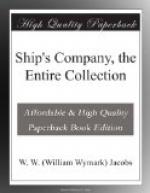“They go like it sometimes,” said Mr. Smithson, “and when they do nothing will save ’em.”
Mrs. Phipps thanked him. “It’s very kind of you to take so much trouble,” she said, quietly; “some people would have lost the cages too while they were about it.”
“I did my best,” said Mr. Smithson, in a surly voice.
“I know you did,” said Mrs. Phipps, thoughtfully, “and I am sure I am much obliged to you. If there is anything of yours I can look after at any time I shall be only too pleased. When did you say Mr. Clarkson was coming back?”
“He don’t know,” said Mr. Smithson, promptly. “He might be away a month; and then, again, he might be away six. It all depends. You know what business is.”
“It’s very thoughtful of him,” said Mrs. Phipps. “Very.”
“Thoughtful!” repeated Mr. Smithson.
“He has gone away for a time out of consideration for me,” said the widow. “As things are, it is a little bit awkward for us to meet much at present.”
“I don’t think he’s gone away for that at all,” said the other, bluntly.
Mrs. Phipps shook her head. “Ah, you don’t know him as well as I do,” she said, fondly. “He has gone away on my account, I feel sure.”
Mr. Smithson screwed his lips together and remained silent.
“When he feels that it is right and proper for him to come back,” pursued Mrs. Phipps, turning her eyes upwards, “he will come. He has left his comfortable home just for my sake, and I shall not forget it.”
Mr. Smithson coughed-a short, dry cough, meant to convey incredulity.
“I shall not do anything to this house till he comes back,” said Mrs. Phipps. “I expect he would like to have a voice in it. He always used to admire it and say how comfortable it was. Well, well, we never know what is before us.”
Mr. Smithson repeated the substance of the interview to Mr. Clarkson by letter, and in the lengthy correspondence that followed kept him posted as to the movements of Mrs. Phipps. By dint of warnings and entreaties he kept the bridegroom-elect in London for three months. By that time Little Molton was beginning to talk.
“They’re beginning to see how the land lays,” said Mr. Smithson, on the evening of his friend’s return, “and if you keep quiet and do as I tell you she’ll begin to see it too. As I said before, she can’t name the day till you ask her.”
Mr. Clarkson agreed, and the following morning, when he called upon Mrs. Phipps at her request, his manner was so distant that she attributed it to ill-health following business worries and the atmosphere of London. In the front parlour Mr. Digson, a small builder and contractor, was busy whitewashing.
“I thought we might as well get on with that,” said Mrs. Phipps; “there is only one way of doing whitewashing, and the room has got to be done. To-morrow Mr. Digson will bring up some papers, and, if you’ll come round, you can help me choose.”




